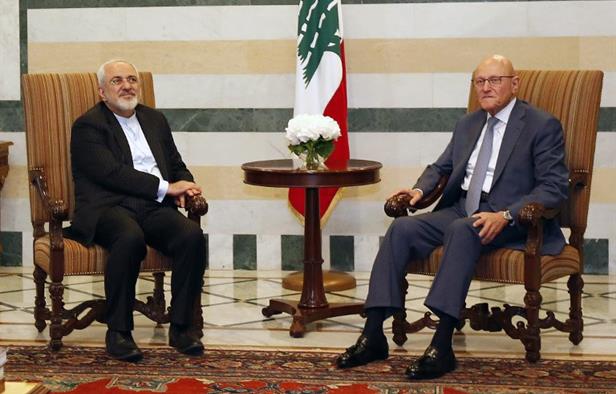No deal for Lebanon?
Hussain Abdul-Hussain/Now Lebanon/February 01/16
Only few weeks lapsed between President Obama’s signing of the Hezbollah International Financing Prevention Act, and his lifting of economic sanctions on Iran. Apart from the contradiction between Obama’s law to deprive Hezbollah of money while at the same time handing Iran — Hezbollah’s financial sponsor — hundreds of billions of dollars, the Lebanese state and Lebanon’s Shiites have emerged as the biggest losers. While European capitals rolled out the red carpet for Iranian President Hassan Rouhani and inked deals with him to the tune of hundreds of billions of dollars, Lebanese bankers — with no government to look after them — flew to Washington to beg America to spare their sector, the mainstay of the country’s economy.
Lebanon’s banks are the Middle East’s oldest and most competent. When communists and Arab socialists toppled the wealthy and ruling notables of Egypt, Iraq and Syria, Arab notables parked their money in Lebanese banks, funding an economic boom that underwrote Lebanon’s “Golden Years” between 1958 and 1975. With the end of Lebanon’s civil war in 1990, banks funded the government’s reconstruction plans, raising the country’s GDP growth to unprecedented levels. Conservative in their performance in a way that shielded them of the world’s real estate bubble and the Great Recession of 2008, Lebanese banks benefit from the country’s wealthy and vibrant diaspora, which ranks among the world’s top ten in cash remittances.
Despite regional instability, Lebanon’s banks have used diaspora’s to buy bonds, with which the government has funded its expenditures and serviced its debt, among the world’s highest relative to its GDP. But now Lebanon’s banks, the only hope for the otherwise sinking Lebanon, risk American sanctions and international isolation. If Lebanon’s banks are undermined, the Diaspora will stop banking in Beirut, thus depriving the country — and its shattered government — of desperately needed cash.
So while Lebanon, its once powerful banks and the government that lives off their deposits start to feel the pinch of America’s sanctions, Hezbollah will prosper benefitting from the lifting of sanctions on Iran. Over the past half-decade, empowering the state facing violent non-state actors, whether Palestinian militias since 1969 or Hezbollah starting 1982, has been America’s policy in Lebanon. But Obama’s foreign policy has been a mix of incompetence and populism. First, the US president appeased America’s enemies and repulsed its allies. Then, in an attempt to save face with some allies, like Israel, he signed into law an act with Hezbollah in its title but that hurts Lebanon and spares the party.
Undermining Lebanon’s banks and starving its government while sparing Hezbollah is not all. While the world welcomes back Iran with open arms, Lebanon remains a pariah state. Tehran and Washington are discussing the restoration of direct flights between the Iranian capital and New York after 36 years of interruption. No one is even thinking of restoring direct flights between Beirut and New York. If anything, more international airliners are looking into ending their flights to Beirut fearing for the security of their planes and crews at an airport that is located in Hezbollahstan.
So while Iranian Shiites might soon start flying from Tehran to shop in New York, Lebanese Shiites will keep dying — in the hundreds — in Syria, fighting “imperialism and world arrogance.” Meanwhile Iran’s smalltime Lebanese ally Foreign Minister Gebran Bassil continues his verbal onslaught on Gulf countries. While Bassil gets rewarded for his position, in cash, Lebanese families are being ejected from their work and residence in the Gulf, further straining Diaspora funds that keep Lebanon afloat. Hezbollah can force Lebanon into becoming a satellite of Iran. But fairness mandates that when Lebanon does Tehran’s bidding, it falls with Iran and rises with it.
Over the past decades, Lebanon — willingly or not — has been Iran’s best ally in the world. The two nations fought together and suffered international reprisal together. But after the nuclear deal, Iran is making up with the world while Lebanon is still unfairly and inexplicably getting the short end of the stick. In the coming weeks and months, everyone will attend peace talks for Syria. The world’s great powers along with Iran, and even chemical Assad, will be at the table. Only Lebanon’s Shiites will not have a say in the future of the Syrian war, where their kids are dying in droves.
There is a lesson from Iran reintegrating into the world economy while Lebanon’s becoming isolated. The Lebanese think of themselves as allies of regional powers, but they are in fact much smaller actors. The Lebanese are mercenaries that powers hire to fight their dirty wars. When the powers make up, the mercenaries remain what they are: Killers for hire.
**Hussain Abdul-Hussain is the Washington Bureau Chief of Kuwaiti newspaper Alrai. He tweets @hahussain.





















